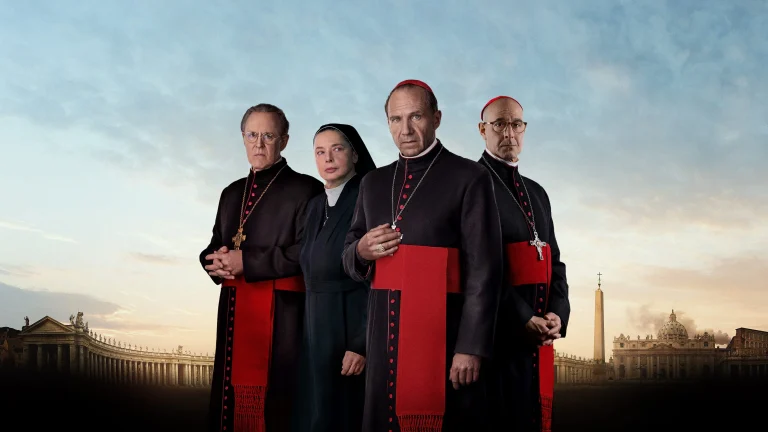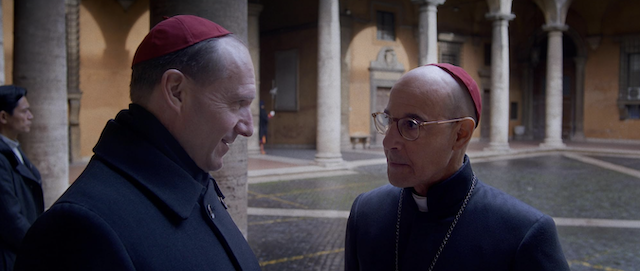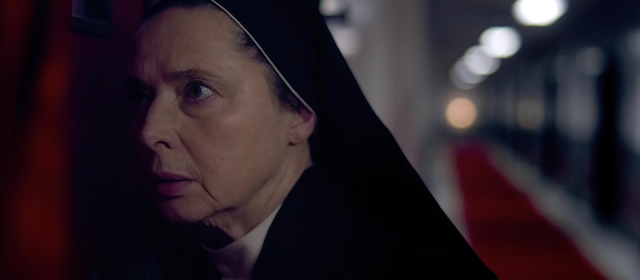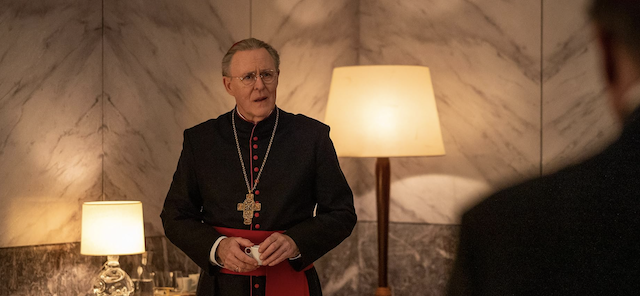
@Courtesy of Focus Features

Q: What was your initial reaction to the research that had gone into Conclave, and the machinations that go on behind those walls?
Edward Berger: First of all, we know very little about it because the doors are closed, it’s the most secretive election in the world, one of the most important spiritual leaders in the world. All I knew before doing this film was white smoke and black smoke. I was raised Protestant. So to take us behind those closed doors was very interesting. We had a lot of great religious advisors, a wonderful religion teacher, a theologist who was there every day and told us about what is known about these elections and guided us through it. We had Robert Harris’ book and Peter Straughan’s screenplay, who had done a lot of research. So there was a wealth of material to fall back on.
Isabella Rossellini: I was born in Rome, and grew up in Rome, I was maybe a little bit more familiar at least with the look of the church, the Sistine Chapel, the rituals, the authority, the secrecy, and the respect of the secrecy. I went to a nun school so for me, that was very good, because I knew that these nuns don’t speak, but they are very severe. They know how to make their presence count.
Ralph Fiennes: There were some clues, our religious advisor on set was very informed about the actual system of voting, quite well documented. None of us knows what goes on in the conversations in the Casa Santa Marta, where all the cardinals stay. So all that stuff is speculation. I was brought up Catholic when I was young, I went to a Catholic primary school in the UK and a Catholic school in Ireland, so I had a sense of the masculine hierarchical structure of the Catholic church. So I felt I had a little foothold in some aspects of the story.
John Lithgow: What was so thrilling to me was just feeling like I was entering into a world where everything was teed up for us actors. We just felt like we were working with the best actors from about thirty different countries in the world. So I felt my research was done for me, I was already surrounded by details that were so accurate. You have this great sense of just how international the College of Cardinals is because we had great talents from all these countries.
Edward Berger: I remember the first time we went into the Sistine Chapel there was quite a sense of awe. We all sat down in your places, there was a wonderful feeling. The built Sistine Chapel obviously, not the real one.
Stanley Tucci: I was brought up Catholic, but I can’t say I could put my faith in that faith, because there was a lot of logic missing. There’s a certain amount of research that you can do but then in the end you have to rely on the book and you have to rely on the script. Everything was so beautifully teed up for us, it was all there. All we had to do was play our roles and listen to Edward when he told us what to do. It was a great pleasure, one of the things that was so interesting was despite the mythology of it, the grandiosity of it, underneath all that –and this is what the film shows – they’re just, they’re just people. And that is kind of scary.
John Lithgow: There were all those wonderful scenes in the cafeteria, which was no different from a high school cafeteria. Everybody clubbing together in their groups, and sort of whispering about each other from table to table.
Q: How important was that level of mundane details for you?
Edward Berger: That was one of the most interesting things to me: Ralph not handling the photocopier, Isabella helping out. The Pope ended up in a plastic body bag, like all of us. In the end, we’ll all end up in the back of an ambulance, and buried somewhere. Cardinals are going to use phones, they’re going to vape, they’re going to smoke, all these things I found incredibly interesting. We look at these men and think they must be holy while they’re men. And they’re women. We wanted to bring them down to earth and make them feel like all of us, with all their weaknesses. They’re going to sin. They’re going to cry. They’re going to make mistakes. They’re human, we’re all human. I also like the contrast between the archaic, the ceiling of the Sistine Chapel, and the cell phone. That’s interesting to me.
Q: How much work did it take to draw all the Cardinals’ different personalities?
Edward Berger: In terms of visuals, I like just not going in one direction and having it all ecclesiastical, but at the same time modern. That contrast, we’ve spruced it up a bit, because the original Casa Marta looks very boring, it’s actually not very cinematic. The rest is just casting. Look at them, they’re all so different. If you find all the same types, it’s going to get very monochromatic. They’re all so different. All of them took energy from each other, and yet you complemented each other. The voice is so important, everyone has a different way of speaking.

@Courtesy of Focus Features
Q : What was the experience for each of you about forming this company? There is this very theatrical feel to it, there are so many group scenes…
John Lithgow: All of us were living in the same hotel. It was very much like all the Cardinals were clubbing together. There was a lot of eating and drinking in all the best places. It was amazing. And we traveled to and from Cinecittá in the same vans, just like the Cardinals. We were clubbing together.
Ralph Fiennes: You can’t plan for the energy between a group of actors. I felt, as John was saying, that we clubbed together, it was a very good feeling amongst us in the room, just organically when we did a read-through of the script, we all got together in Cinecittá, and read the script, and I remember feeling: “Oh there’s a wonderful sense of the collective.” It was organic. It’s not something you can plan for, it was there. And I felt it was there amongst us all the way through the shooting.
The story gives us that sensibility and Edward is a wonderful enabler of that spirit, in all the scenes. He let us play, let us find things. That’s great between a group of actors when you feel that you have permission and are encouraged to play. The spirit of the director can either be very precise and controlling, or they have that in them which allows, and gives permission. I felt Edward had that, and it’s wonderful for us as actors.
Stanley Tucci: You’re absolutely right. When you have a director like that, who really appreciates actors and trusts them, you have that latitude to play, and each take can be different. What makes Edward so great is he allows for that, but also there is no doubt that there is this incredible assurance when you look at the film, a complete clarity of vision.
Q: So much of your work involves communicating without words. What did you make of your character? How did you work finding your presence in each of these scenes?
Isabella Rossellini: I witnessed it, because I am Roman and Catholic and went to Catholic school, so I know that there was a very specific hierarchy. Women were not submissive tho, they were silent but not submissive. That was very clear to me. I remember one of the first days I shot, it was a wide shot of something and it was us, the nuns, walking, and the cardinals walking. We were like oil and vinegar, we never mixed. It was like choreography, they were all talking to one another. So you have these characters moving differently, and you immediately understand the role of each one. That was very inspiring to me. Because I understood I had to be a shadow. But shadows are always present. The shadow was my inspiration.

@Courtesy of Focus Features
Q : What was for you Sister Agnes in terms of her role in the film, and the importance of her role?
Edward Berger: Isabella is basically the only female presence for a long time in the movie. The nuns are there to organize, to make sure that all the cardinals have everything they need for the voting process. We talked about this on our first Zoom I said: “Listen, the role is very silent for a long time. But don’t see this as a small role, this is a central one. She is the keeper of all these guys who have come together, and she observes everything. And I’m going to film that. I really want to see what you’re thinking.” There were a lot of close-ups of Isabella. She really watches from the back seat. The first time we showed the movie with an audience in the United States, in Telluride at the festival, Isabella does one thing in the movie, and everyone starts cheering, because she speaks the audience’s mind, she in a way is us.
If you like the articles, share your thoughts below!
Check out more of Adriano’s articles.
Here’s the trailer for Conclave:

